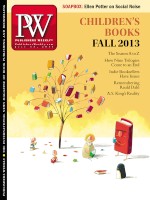On July 10, federal Judge Denise Cote ruled that Apple and five major publishers did conspire to fix e-book prices in 2010. After nearly two years of litigation (dating back to the first class-action suit) and 11 days of live testimony in June, it took the judge just 20 days to deliver her opinion. And in the end, it wasn’t even close. In an eloquent 160-page decision, Cote soundly rejected each of Apple’s defenses. And while publishers were not on trial and admitted no wrongdoing in their settlements, the decision also deemed them guilty of collusion. “Apple is liable for facilitating and encouraging the Publisher Defendants’ collective, illegal restraint of trade,” Cote found.
In a statement, Apple representatives maintained their innocence and vowed to appeal. Christopher Sagers, a law professor at Cleveland State University who has followed the case closely, said that the odds of Apple winning an appeal on the merits are long, but he does see a potential opening: Cote’s May 23 “tentative view” in which she expressed her belief that the government would prevail.
“I can imagine Apple saying on appeal that her statement at the beginning of trial showed bias or prejudice,” Sagers observed, referencing another major antitrust case—Microsoft. In that case, the court of appeals gave the company a reprieve from much of Judge Thomas Penfield Jackson’s order, because Jackson told a reporter, off the record, that he believed Microsoft should be held liable before he had issued his decision.
“[The court of appeals] did so even though it absolutely, unequivocally believed that Microsoft was guilty of the bad conduct alleged, and not because it even believed that Jackson was really biased,” Sagers explained, noting that the appeals court reversed Jackson’s order that Microsoft be broken up into separate companies, but affirmed the finding of liability. “The court of appeals believed that the appearance of impropriety was significant enough that the defendant should get significant relief.”
In fact, in opening arguments, Apple’s lead counsel, Orin Snyder, made Cote’s tentative view an issue, such that Cote was compelled to respond from the bench and assure Snyder that Apple would get a fair trial.
If Apple strikes out on appeal, remedies will eventually be resolved by settlement of the parties, or through a “mini-trial” to determine liability. The Department of Justice will seek injunctive relief of the kind it imposed on the publishers in their settlements, while the states and consumer classes will ask for money damages. That means, in addition to which publishers have pledged to return almost $175 million to consumers, largely in the form of book credits, Apple could also soon be forced to pay up.
For the publishers, this long legal nightmare ended with the trial. Their fates were sealed with their respective settlement agreements. But despite being labeled conspirators alongside Apple, the houses could actually benefit from the judge’s decision. If Apple is made to pay consumers, and those funds are also distributed as e-book credits, a tidy sum could potentially flow from Apple coffers, through readers, to publishers’ bottom lines.
The verdict has little impact on the e-book industry otherwise. Whether seen as an illegal scheme to fix prices (as Cote ruled) or as a shrewd business move (as the defendants argued), the plan hatched by publishers and Apple succeeded in moving the e-book business to a new model.
In her ruling, Cote explicitly acknowledged that none of the market practices Apple and the publishers embraced—including agency agreements, pricing tiers with caps, MFN clauses, and simultaneous negotiations with suppliers— were found to be illegal.
“The Plaintiffs have not argued and this Court has not found that any of these or other such components of Apple’s entry into the market were wrongful, either alone or in combination,” Cote held. “What was wrongful was the use of those components to facilitate a conspiracy with the Publisher Defendants.”



 Volume 260
Issue 28
07/15/2013
Volume 260
Issue 28
07/15/2013





